December 12, 2018
2018-2019 Magnuson Scholar Updates
The 2018-2019 Magnuson Scholars are:
Michael Baldwin
School of Dentistry
Steve Coppess
School of Medicine
Kelsey Hirsch
School of Nursing
Weize Huang
School of Pharmacy
Jennifer Velloza
School of Public Health
Bianca Altamirano
School of Social Work
Scholar Profiles
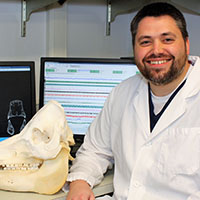 Michael Baldwin
Michael Baldwin
School of Dentistry
It has been a true honor to be a Magnuson scholar. This scholarship has help tremendously in supporting my PhD training. It has helped to cover tuition and living costs allowing me time to focus on my research, assisted my membership in academic and professional organizations, and helped to cover my attendance at research conferences. My research is focused on the causes and consequences of facial malformations using a novel pig model. I have made substantial progress since being selected as a Magnuson scholar. I have taken several computed tomography images detailing the internal structures of the head, prepared histological sections of relevant tissues, developed a sensor for measuring breathing parameters, and co-authored two publications. I have made significant observations about possible causes and consequences of deficient facial growth, and I am excited to further investigate my findings this coming year.
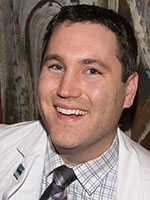 Steve Coppess
Steve Coppess
School of Medicine
I am honored and grateful to be selected as a Magnuson Scholar. I am also greatly humbled by the other scholars, current and past, and their accomplishments. Thank you for selecting me and for your generous award.
This award has helped me continue my studies and research in medicine. Since being awarded, my research with Dr. Kaalan Johnson and the team at Seattle Children’s Hospital has progressed well. We presented our research at a national conference and were awarded the 2018 Seymour Cohen award for our study A pilot study assessing clinic value in pediatric pharyngeal dysphagia: The OPPS/cost method, which was subsequently published in the Laryngoscope. We were also fortunate to be awarded the 2018 3rd place Charles Ferguson award for Pediatric Dysphagia: Is Interarytenoid Mucosal Height Significant?, currently pending publication in the Laryngoscope. Lastly, we gave a podium presentation for Standardizing Laryngeal Cleft Evaluations: Reliability of the Interarytenoid Assessment Protocol, which was subsequently published in the American Academy of Otolaryngology – Head and Neck Surgery. The Magnuson scholarship helped support the team and success of these projects.
We are continuing our research with the next phase being multi-site validation of the OPPS/Cost and Interarytenoid Assessment Protocol studies above, and additional exciting unrelated research. I am confident that the work the Magnuson scholarship has allowed me to pursue is improving patient care and will make a difference in the lives of children. I am grateful for having the support of the Magnuson scholarship, the highest of quality medical education from the University of Washington School of Medicine, Dr. Kaalan Johnson’s mentorship, the support and patience of my family, and the opportunity to pursue my calling in medicine.
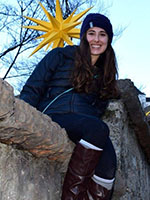 Kelsey Hirsch
Kelsey Hirsch
School of Nursing
I am so grateful for the support of the Magnuson Scholarship! Thanks to this financial support, I have been able to conduct my dream research study, without cutting any corners. My research is well underway, now, and I am on track to graduate this Spring. I have spent the last three months visiting the jail in Des Moines to interview participants before their release, and then meeting them at release to take them straight to a primary care provider appointment. The goal of the project is to better understand the barriers to care faced by individuals who are attempting to reintegrate into society; as well as to see if an intervention that attempts to hand off individuals to a provider immediately following release would improve future relations with healthcare.
So far, I have been able to identify a multitude of barriers faced by recently released inmates, many of which cannot be fixed by an intervention focused on transportation and scheduling issues. I have come to learn that there are huge systems issues at play, and that the population I am working with is even more neglected in healthcare than I realized. Just the process of conducting a study inside a jail, with a historically challenging population to follow up with, has taught me so much about the methodological challenges faced in this area of research. This research has opened my eyes to a World of questions, and I am looking forward to discovering what the next study could focus on.
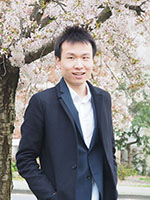 Weize Huang
Weize Huang
School of Pharmacy
I am very grateful and honored to be selected as the recipient of the 2018–2019 Warren G. Magnuson Scholar at the University of Washington, Seattle. It provides me tremendous support and encouragement to keep pursuing the research projects I am interested in and maintaining my academic achievement.
Research on pharmaceutical science has been dramatically enriched by quantitative and computational science over the last decade. Simulation and modeling approaches permit a much closer association and incorporation of basic science and in vitro experimental data with real world application and decision making. This allows the translation of laboratory results into the actual utilizations in our daily life and activity, especially from the clinical and industrial perspectives.
Since receiving the Magnuson Scholarship, I have made significant progress and published the in silico kidney model that can predict the renal drug disposition and clearance. Currently, I am actively working on expanding the kidney model to incorporate the renal disease development and to capture the disease’s impact on drug behavior inside human body. This model may help physicians formulate optimal therapeutic regimens and inform pharmaceutical companies the pharmacokinetic failure risk of new drug entities during drug discovery process. It is potentially useful for diabetic patients and cardiovascular disease patients who have compromised kidney function due to renal diseases and complications.
The Magnuson Scholarship helped me immensely as I can attend conference and workshop (ACOP9 in San Diego 2018) to widen my knowledge and expand my network. In addition, this award also supports me to present my work in the future conference (ASCPT in Washington DC 2019) to gain constructive feedback on my research project. Altogether, I really appreciate the UW School of Pharmacy for my nomination, and I am extremely grateful to all the people who have helped me along with my academic journey.
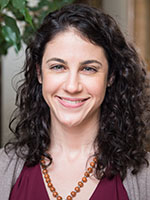 Jennifer Velloza
Jennifer Velloza
School of Public Health
I am incredibly honored to be a recipient of the 2018-2019 Magnuson Scholarship. Being a Magnuson Scholar has meant that I could spend this past year focused on my dissertation research, completing my doctoral studies, and going to conferences and networking events to position myself as an independent HIV prevention researcher. My dissertation is nested within four prospective studies of HIV pre-exposure prophylaxis (PrEP) delivery among women in sub-Saharan Africa and I have been able to spent the past several months traveling to project sites in Kenya and South Africa, cleaning and analyzing data, and attending conferences to present on this work. I have also had the freedom of time to work on additional analyses and side projects will inform my next grant applications on integrated HIV prevention and mental health interventions for South African women.
During my time as a Magnuson Scholar, I have published dissertation research showing that depression is significantly associated with low PrEP adherence for women in Kenya, Uganda, and South Africa. We have also found that reported relationship trust issues, intimate partner violence experiences, and stigma experiences are related to mental health and HIV risk, while feelings of social support can empower women to use PrEP regularly and engage in HIV prevention activities. This research has highlighted opportunities for future PrEP delivery interventions among women. Finally, I have been working to refine depression and HIV risk perception measurement to improve the identification of women who would benefit from linkage to mental health and HIV prevention services. The Magnuson Scholarship will continue to support my abilities to expand my research network, attend conferences and publish manuscripts, and seek out professional development opportunities. I am so grateful to benefit from this wonderful scholarship program.
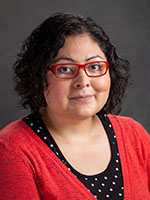 Bianca Altamirano
Bianca Altamirano
School of Social Work
It has been an immense honor to be selected as one of the 2018-2019 Magnuson Scholars. The award has allowed me to focus on the development of my dissertation and the completion of my doctoral studies. Further, the award has allowed me to sharpen my skills as an independent researcher since I am collecting my own data in Arizona, having left Seattle at the start of the 2018-2019 academic year. My dissertation examines the mental health system in a border state through the eyes of organizations. I am interviewing practitioners, administrators, and frontline workers to better understand the impact of living in the current sociopolitical environment while trying to create mental health access for Latinx-identified persons. A qualitative study, my project attempts to gather information on the complexities of working with an underserved population with the often limited resources afforded to mental health organizations. An understudied area of focus, the publications from this research aim to broaden our understanding of how to improve mental health access for this population as well as how to strengthen resources within local clinics and other mental health services.
In the months since receiving the Magnuson Scholarship, I have been able to submit drafts of each of my three papers toward fulfillment of the dissertation requirement, make connections in the Phoenix community, and make headway in my recruitment efforts. The award also allows me to provide compensation awards to my participants that I otherwise might not have been able to adequately provide. The award has allowed me to travel around the Phoenix area to gather data and make community connections, as well as subscribe to a qualitative coding software program to aid in my data analysis phase. The support of the Magnuson Scholarship has afforded me the ability to focus on my dissertation in ways that I had not previously thought imaginable. I will be forever grateful toward the Magnuson family for this generous award, as well as toward its development for the Health Sciences programs.